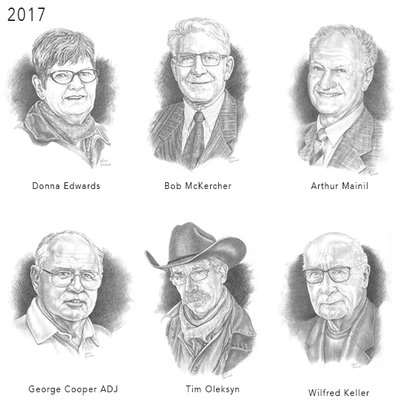Six individuals were honoured on April 22
By Diego Flammini
Assistant Editor, North American Content
Farms.com
Six members of Saskatchewan’s agricultural community took their place in the Saskatchewan Agriculture Hall of Fame on April 22.
The class of 2017 includes Donna Edwards, Bob McKercher, Arthur Mainil, George Cooper, Tim Oleksyn and Wilfred Keller.
Donna Edwards
Born in Nokomis in 1949, Edwards works with her husband and two sons on their 4,000-acre grain and cow-calf operation. She was elected to the board of directors of the Saskatchewan Seed Growers Association (SSGA) in 1995 and became its president in 2001. Edwards was the first woman to serve the pedigreed seed industry in that position.
In 2006, she received the Outstanding Service Award from the SSGA and, in 2007, she received the Robertson Associate Award from the Canadian Seed Growers’ Association.
In 2008, she was elected to represent Saskatchewan on the Canadian Seed Growers’ Association.
Bob McKercher
McKercher grew up on a farm near Rosetown and was instrumental in the University of Saskatchewan’s College of Agriculture.
After receiving his BA and BSA in 1954, and MSc in 1956, he became the first Departmental Assistant in Soil Science at the college. McKercher oversaw province-wide field strip fertilizer testing and other soil analyses.
In 1963, he earned his Ph.D. while researching soil phosphorous in Scotland.
In 1997, McKercher became the College of Agriculture’s Assistant Dean (Planning) for one year to chair a building committee.

The 2017 Saskatchewan Agriculture Hall of Fame inductees
Photo: Saskatchewan Agriculture Hall of Fame
Arthur Mainil (1933-2011)
A farmer from near Benson, Mainil was the founding president for the Weyburn Inland Terminal, the first farmer-owned inland grain terminal in Canada.
He began the terminal in 1974 to improve grain handling. He served as its first president from 1975 to 1979.
Mainil believed modern practices, like protein grading and loading 100-car unit trains, were necessary for Prairie agriculture to be sustainable.
He also helped found The Palliser Wheat Growers Association, which would become the Western Canadian Wheat Growers Association.
George Cooper (1924-2016)
Born on a farm in the West Band region, Cooper graduated from the University of Saskatchewan’s School of Agriculture in 1944.
Cooper raised purebred Shorthorn cattle and was one of 10 farmers to establish Prairie Feeders, a 1,800-head feedlot in Regina, and Producers Abattoir.
He served as a member of the Senate Board for the University of Saskatchewan and helped kickstart fundraising for new College of Agriculture building.
From 1987 to 1989, Cooper lived in the Sudan as farm manager of a 10,000-acre joint project between the Canadian International Development Agency and the Sudanese government. In his two years there, he taught farming techniques to the local residents.
Tim Olesksyn
Born in Prince Albert, Oleksyn, and his wife Cindy are partners at Oleksyn Brothers Farms with his brothers Doug and Terry. Tim manages South Ranch, the livestock operation.
Throughout his life, Tim has dedicated himself to various boards, including the Beef Cattle Research Council, Saskatchewan Stock Growers Association and the Prairie Agricultural Machinery Institute.
Wilfred Keller
Keller grew up on a farm near Melville and holds a Bachelor of Science degree and Ph.D. in crop science from the University of Saskatchewan.
Keller also completed a postdoctoral fellowship at the Max-Plank Institute fur Biologie in Germany.
Upon his return, Keller worked for Agriculture Canada’s Research Centre from 1973 to 1989.
In 1989, he joined the National Research Council’s Plant Biotechnology Institute in Saskatoon. Keller remained there for 19 years.
Keller led the development of new breeding technologies in canola, flax, mustard and broccoli. His team’s work helped conduct the first plant gene transformation experiments and helped develop the first herbicide-tolerant canola variety in the continent.
Farms.com congratulates the inductees and their families!